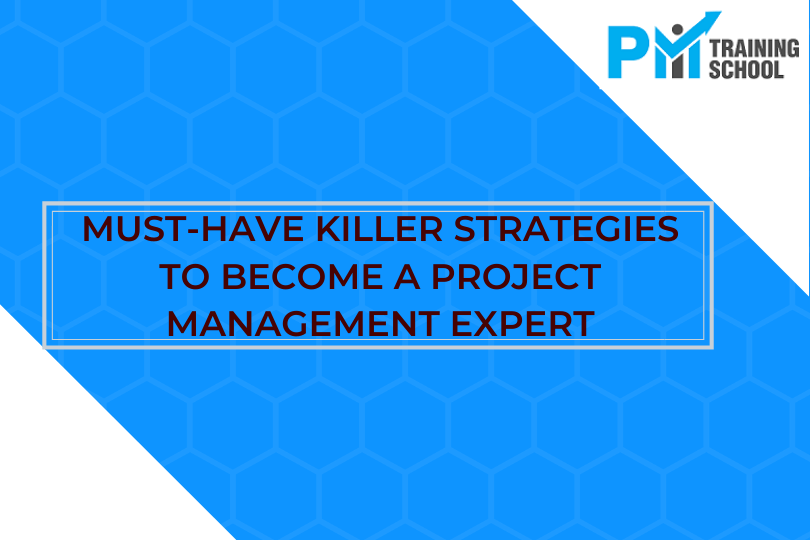“A vision without a strategy remains an illusion.” – Lee Bolman, the author of the famous book “Reframing Organizations: Artistry, Choice, and Leadership”
The above quote makes it clear to us that having goals but not framing a suitable strategy to execute those goals would remain futile. A strategy is essentially a plan of action designed to accomplish an overall objective. In project management, it is primarily the responsibility of the project manager to devise specific strategies for the successful attainment of a project’s goals.
In this article, let us discuss seven killer strategies which are vital for one to become a project management expert.
1.Influential Communication
“Priorities and plans may change, deadlines could be missed, the scope might increase, but communication must stay consistent.” – Liz Helbock, senior director of Events.com
Effective communication not just impacts the project team but the clients and other stakeholders too. No client would feel bothered too much about the regular updates he receives from the project manager regarding their project. Rather he would appreciate keeping him posted about the project’s progress or deterioration. Good communication will keep you continually aligned with the project and enables better rapport building.
The prominent tools of effective communication include emails, project schedule updates, meetings, status reports, and so on. As a project manager, you should coordinate these lines of communication and ensure that everybody has access to all the relevant details of the entire project.
2.Understanding the client’s objects
“I don’t begin a project until I fully understand it. This means that I will not proceed until I have nailed down the project sponsor’s vision.” – Michiko Diby, a popular project management analyst
As an effective communicator, a project manager should let the client open up about all his objectives, needs, and wants that pertain to the project without any interruption whatsoever. Once he’d expressed all his expectations, the project manager should ask and clarify his doubts regarding the client’s requirements of the project.
The project manager should not only acknowledge a client’s objectives but should also challenge its realism, which does not appear to be rational or practically feasible.
3.Efficient Leadership
“A leader is best when people barely know he exists when his work is done, his aim fulfilled, they will say: we did it ourselves.” – Lao Tzu, Chinese philosopher
If you have already led projects, you must have certainly learnt that leadership is by and large the most significant quality of a project manager. Leadership is often wrongly considered to be an act of imposing orders to inferior workers. A competent leader is rather one who facilitates a group of members to achieve their work goals which in turn accomplishes the overall objectives of the project.
Leadership roles include setting the vision, managing, motivating, serving, coaching and inspiring the team. Telling your team members what to do is not leading. As a project manager, you should lead from an operational and strategic perspective. You should communicate the objective and get the team buy-in, assess their performance and make sure that all the team members have the time, space, resources and money they require to get things done.
4.Comprehensive Planning
“Planning is bringing the future into the present so that you can do something about it now.” – Alan Lakein
Planning and project scheduling are core project management skills which surprisingly are not paid enough attention to by project managers. You should schedule tasks in an appropriate order to obtain the required outcome within the available time frame. Along with scheduling, you should also consistently monitor the progress of the project and accordingly, make necessary tweaks.
5.Time Management
“Time management is surely the most critical aspect of acing multiple arenas: home, work, and family.” – Sonali Bendre
No plan would be successful without defining its time factor. A huge part of the job of project managers is to determine how the team members spend their time and how he spends his own time. Time management skills include the knowledge of knowing when to say “No”. Time management roles primarily include delegating responsibilities, multi-tasking whenever possible, and rearranging your schedule when necessary. An empathetic project manager always respects his teammates’ time by reading their body language during work.
6.Adept Negotiation
“Negotiating the use of resources, budgets, schedules, scope creep, and a variety of other compromises that are unavoidable. Knowing how to negotiate well so that all parties are satisfied is a key skill for a successful project manager.” – Cesar Abeid
Project management is often similar to politics. It brings together a diverse group of individuals with conflicting interests. It is in the hands of the project manager to bring the disparate interests on the same page to achieve the project goals.
The art of negotiation includes investing enough time to understand the stakeholders’ interests and team members’ professional and personal relationships. This is essential to identify what is to be demanded from whom, and how it must be done to move the project forward.
7.Effective Risk Management
Regardless of the situations and circumstances, everyone effortlessly points out to the project manager asking whether he had foreseen to prevent a particular risk before it became a problem.
Good risk management involves not letting project sponsors face surprises, especially nasty ones during the execution of the project. So, it would be wise if you as a project manager keep the sponsors informed about the probable risks and contingencies that are likely to occur. You have to stay on top of your project by regulating risk and actively mitigating it as far as possible.
Risk management skills are often self-taught by years of experience. You must lend your ears to your team members who possess the relevant project experience to prevent and control future risks.
Do these strategies seem complete to you? What are the other project management skills you’re trying to develop apart from these? Do let us know by writing to us.


Recent Comments